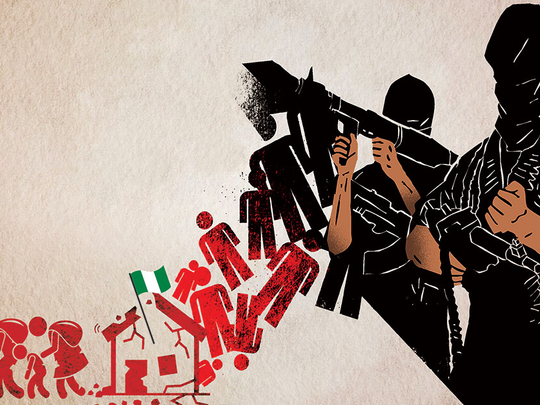
Boko Haram, the terrorist organisation that controls vast swathes of territory in north-eastern Nigeria and has expressed support for Daesh (the Islamic State of Iraq and the Levant), has grabbed headlines around the world for recent outrages, including what may have been one of the worst terror attacks of the modern era and attacks using bombs strapped to girls, one perhaps as young as 10.
Little attention, however, is being paid to another humanitarian crisis spawned by Boko Haram that, if left unattended, has the potential to destabilise the region and bolster the group for years to come.
As Boko Haram has advanced, tens of thousands of people have fled into fragile neighbouring countries that are ill-equipped to provide shelter. This influx of refugees is sowing the seeds of a prolonged humanitarian and security crisis. The United States should lead an urgent international response to address the emergency and prevent greater damage.
The UN High Commissioner for Refugees (UNHCR) estimates that 135,000 Nigerians have fled into Cameroon, Chad and Niger to escape Boko Haram’s rampages. The January 3 massacre in Baga, where as many as 2,000 people were killed, caused a surge in displacement. More than 12,000 people have fled to Chad since the attacks, including hundreds who were trapped for days on an island in Lake Chad.
Cameroon, Chad and Niger are struggling to cope with the influx of refugees. These countries are poor — Niger is last and Chad fourth from last in the UN Human Development Index, which measures countries’ economic and social development — prompting all three and the UNHCR to issue urgent calls for help.
Cameroon already has nearly 200,000 refugees who fled unrest in the Central African Republic. Niger, an important US ally that hosts a drone base, faced a food crisis in the Diffa region even before it took in more than 87,000 Nigerian refugees.
If the world fails to respond, the crisis spawned by Boko Haram will extract a high price. When refugees have no place to go, they form settlements wherever they start congregating, often in areas inadequate for hosting them. It is normally too difficult to relocate these settlements, so they turn into permanent camps, leaving their occupants to live in inhospitable environments.
Convenient sources of prey
Unplanned camps are often not far enough from conflict and become long-term sources of instability. Refugees may remain within reach of armed groups that find camps a convenient source of prey, recruits and succour. Boko Haram frequently conducts raids into neighbouring countries and has the ability to reach any camp near the border. The group would not hesitate to exploit the camps, strengthening itself at a time when the world should be rallying to defeat it.
While the immediate needs are critical, the world must also respond to this crisis as a long-term humanitarian and security problem and build the capacity to cope with future floods of refugees. Despite Nigerian President Goodluck Jonathan’s recent optimistic assessment, Boko Haram is becoming more powerful and routinely humiliates an outmatched Nigerian army.
Regional cooperation has thus far been stillborn, and the Nigerian government has rebuffed critical assistance offered by the United States. To complicate matters, national polls are scheduled for February 14, and Nigeria has a history of violent elections. With no end in sight to the instability, more refugees are certain to stream out of Nigeria.
Nigeria is a prickly partner that has largely frustrated the few international efforts made to fight Boko Haram, but acting quickly on the refugee crisis would not require Nigerian cooperation and would be an effective way for nations to join the battle. The United States should rally the world to fund appeals by the refugee-hosting governments and relief organisations.
The UNHCR is asking for about $25 million (Dh91.8 million), a rounding error in most developed countries’ budgets. Meeting these appeals would have the added benefit of tangibly assuring US allies in the region of America’s commitment.
The United States and others should also lend their expertise to help Nigeria’s neighbours provide sufficient security to ensure that the camps do not become dangerous for refugees or a source of relief for Boko Haram. Humanitarian workers and the camps themselves will need military protection, and a strong police force will be necessary to keep order.
Since it is impractical to monitor Nigeria’s long and porous borders, the United States should help Nigeria and its neighbours establish humanitarian corridors to protect and guide fleeing refugees while also providing security forces an opportunity to screen for militants moving with the refugees.
Boko Haram is a terrible threat to a fragile region important to US interests. The international community — partly because of the Nigerian government’s profound insufficiencies — has thus far failed to treat it with the urgency it deserves. The refugee crisis and its humanitarian and security implications are yet another call to action that we cannot afford to ignore.
— Washington Post
Credit: Joshua Meservey is assistant director of the Atlantic Council’s Africa Centre.










